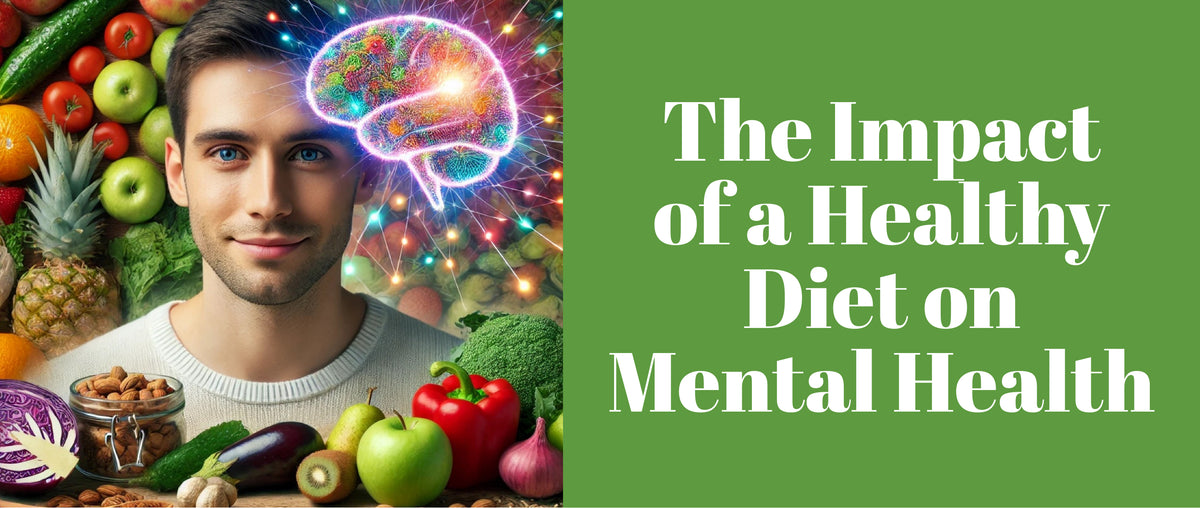The Impact of a Healthy Diet on Mental Health
healthy eating is often associated with physical health, but its impact extends far beyond just the body. The connection between a healthy diet and mental health is profound, influencing everything from mood and cognition to energy levels and overall well-being. In this comprehensive guide, we’ll explore how what we eat can directly affect our mental health and offer practical tips to incorporate plant based foods, cholesterol free foods, and other Healthy Snacks for Kids and adults into our daily routines.
The Science Behind Diet and Mental Health
Gut-Brain Axis: The Connection Between Your Gut and Mind
The gut-brain axis is a complex communication network that links the emotional and cognitive centers of the brain with peripheral intestinal functions. This connection is vital for understanding how dietary habits can affect mental health. The gut microbiome, which consists of trillions of microorganisms, plays a critical role in this interaction. Diets rich in plant based foods like Vegan Cheese and Unsalted Butter can promote a healthy gut microbiome, which in turn supports mental health.

Key Nutrients for Mental Health
Certain nutrients have a direct impact on mental well-being. Here’s a breakdown of some critical components:
- Omega-3 Fatty Acids: Found in foods like walnuts and flaxseeds, these fatty acids are crucial for brain health. They help reduce inflammation and have been shown to lower the risk of depression.
- B Vitamins: B vitamins, particularly B12 and folate, are vital for the production of neurotransmitters like serotonin and dopamine. Incorporating High Protein Vegan Food and High Protein Vegan Breakfast options that include fortified cereals or nutritional yeast can help maintain adequate levels.
- Vitamin D: This vitamin, often called the sunshine vitamin, plays a role in mood regulation. Low levels of Vitamin D are associated with depression and mood disorders. Consuming vegan butter fortified with Vitamin D can be a good dietary source.
- Antioxidants: Antioxidants help fight oxidative stress in the brain, which can lead to cognitive decline and mood disorders. Foods rich in antioxidants include berries, dark chocolate, and leafy greens. Incorporating these into Healthy Snacks for Kids can boost their mental health as well.
How Different Diets Impact Mental Health
Mediterranean Diet
The Mediterranean diet is renowned for its benefits on heart health, but it also has a significant impact on mental health. This diet emphasizes whole grains, fruits, vegetables, nuts, seeds, and healthy fats like olive oil. The abundance of plant based foods and cholesterol-free foods in the Mediterranean diet contributes to lower rates of depression and anxiety.
Western Diet
In contrast, the Western diet, which is high in processed foods, sugars, and unhealthy fats, is linked to increased rates of mental health issues. This diet is deficient in essential nutrients that support brain function, leading to higher levels of inflammation and oxidative stress.
Vegan and plant based Diets
Vegan and plant based diets are rich in nutrients that are beneficial for mental health. Vegan cheese, kombucha, cashew butter, and garlic butter are examples of plant based foods that are not only delicious but also contribute to better mental health by providing essential vitamins and minerals. These diets are typically high in fiber, antioxidants, and anti-inflammatory compounds, which are all crucial for maintaining mental well-being.
Specific Foods that Boost Mental Health
Leafy Greens
Leafy greens like spinach, kale, and Swiss chard are rich in folate, which is essential for neurotransmitter function. Folate deficiency has been linked to depression, making these vegetables an important part of a healthy diet.
Fermented Foods
Fermented foods such as Kombucha , yogurt, and kimchi are rich in probiotics, which promote a healthy gut microbiome. A healthy gut is closely linked to a healthy mind, as the gut produces many of the neurotransmitters that regulate mood.
Nuts and Seeds
Nuts and seeds, including almonds, chia seeds, and flaxseeds, are excellent sources of Omega-3 fatty acids, magnesium, and zinc. These nutrients support brain function and can help reduce symptoms of anxiety and depression. Incorporating cashew butter and plant based protein sources like nuts into your daily diet can significantly boost mental health.
Also Read
The Role of Lifestyle in Mental Well-being
Hydration
Staying hydrated is crucial for cognitive function. Dehydration can lead to fatigue, difficulty concentrating, and mood swings. Healthy Drinks such as Oat Milk and infused water can be delicious ways to stay hydrated while also providing essential nutrients.
Regular Meals
Maintaining a regular eating schedule helps stabilize mood and energy levels. Skipping meals can lead to low blood sugar, which can cause irritability and fatigue. Consuming balanced meals that include low fat mayonnaise, parmesan cheese, and Cheddar Cheese ensures you get a steady supply of nutrients throughout the day.
Mindful Eating
Mindful eating involves paying attention to the experience of eating, savoring each bite, and recognizing hunger and fullness cues. This practice can help prevent overeating and promote a more positive relationship with food, which is essential for mental well-being.
Potential Risks and Considerations
Nutrient Deficiencies
Dietary choices can sometimes lead to nutrient deficiencies, which can impact mental health. For example, a lack of B12, often found in animal products, can lead to depression and cognitive decline. For those following a Vegan Bodybuilding Diet, it’s important to include fortified foods or supplements to avoid deficiencies.
Processed Foods
Highly processed foods, which are high in sugar and unhealthy fats, can negatively impact mental health. These foods often lead to spikes and crashes in blood sugar, contributing to mood swings and anxiety. Opting for heart-healthy diet options instead of processed snacks is a better choice for maintaining mental stability.
Caffeine and Alcohol
While moderate caffeine intake can boost alertness, excessive consumption can lead to anxiety and disrupt sleep. Similarly, alcohol, a depressant, can exacerbate symptoms of depression and anxiety. It's important to consume these substances mindfully and in moderation.
Practical Tips for Incorporating a Mental Health-Friendly Diet
Meal Planning
Meal planning is an effective way to ensure that you’re consuming a diet that supports mental health. Preparing meals ahead of time can help you avoid the temptation of unhealthy foods. Include high protein snacks like nuts, seeds, and Plant Based Protein bars to keep energy levels stable throughout the day.
Healthy Swaps
Making small changes in your diet can have a big impact on mental health. For example, swapping sugary snacks for Healthy Snacks for Kids like fruits or High Protein Vegan Breakfast options can provide sustained energy and improve mood.
Supplements
While it’s best to get nutrients from food, supplements can be helpful, especially for those following a Vegan Bodybuilding Diet or those at risk of deficiencies. Supplements like Omega-3 fatty acids, B12, and Vitamin D can support mental health when dietary intake is insufficient.
Conclusion
The connection between diet and mental health is undeniable. A healthy diet rich in plant based foods, cholesterol-free foods, and high protein vegan food not only supports physical health but also plays a crucial role in maintaining mental well-being. By making informed dietary choices and incorporating nutrient-dense foods into your meals, you can enhance your mood, cognitive function, and overall mental health.
Do you enjoy vegan food? We have a list of vegan restaurants in India to help you find delicious options in your area!










